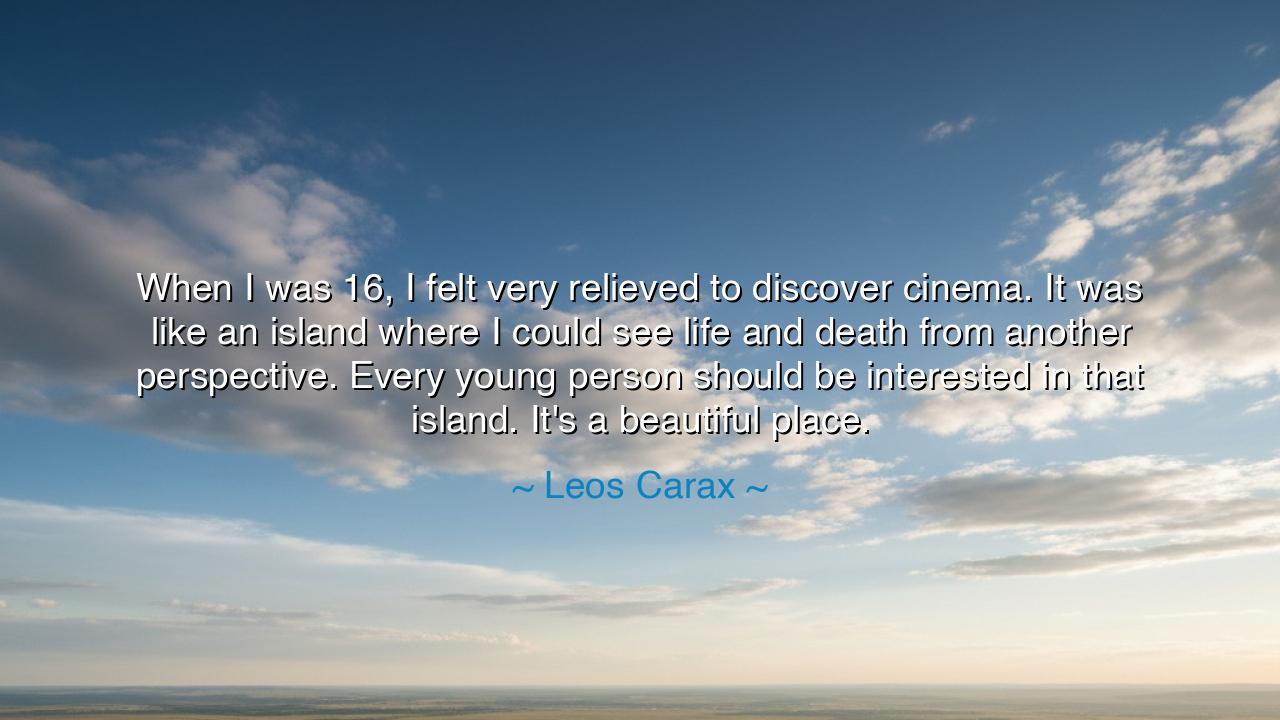
When I was 16, I felt very relieved to discover cinema. It was
When I was 16, I felt very relieved to discover cinema. It was like an island where I could see life and death from another perspective. Every young person should be interested in that island. It's a beautiful place.






“When I was 16, I felt very relieved to discover cinema. It was like an island where I could see life and death from another perspective. Every young person should be interested in that island. It's a beautiful place.” — thus spoke Leos Carax, the enigmatic poet of the moving image, a man who sees in cinema not mere entertainment, but revelation. His words are a hymn to art as refuge, to the sanctuary where the soul may contemplate life and death without fear, and through that contemplation, find meaning. To the youth lost in confusion, to the dreamer seeking truth, Carax offers the island of cinema — not as escape, but as transformation.
In the style of the ancients, we might say that Carax discovered a sacred grove of images — a place apart from the noise of the world, where thought and emotion intertwine like vines upon a tree of light. For at sixteen, when the storm of youth rages fiercest, when the world feels unbearable and uncertain, the artist found his island — a vision of existence that could be observed, shaped, and understood. Cinema became for him what philosophy was for the Greeks: a mirror through which to behold the soul. To watch the stories of others was to see his own reflection in a thousand forms, to realize that suffering and joy were not his alone, but the universal condition of humankind.
The ancients knew this power well. The Greek theatre was born not for amusement, but for purification. Through tragedy, men and women were taught to look upon their fears — death, betrayal, love, fate — and emerge renewed. So too does Carax speak of cinema as an island of perspective, where the viewer becomes both participant and witness. There, one may look upon death without dying, upon sorrow without being destroyed, upon passion without losing reason. It is an act of spiritual training, a preparation for life itself. The screen becomes the sacred fire around which humanity gathers to remember who it is.
Carax’s words rise also from the soil of his own era — the 1970s, when he was a young man in a world both liberated and lost. In those years, the old certainties were crumbling: faith, family, even identity were being remade. For many, this birth of freedom was also a kind of exile, a casting away from tradition’s shores. In discovering cinema, Carax found an island of meaning in the ocean of uncertainty — a place where creation replaced chaos. To him, art was not a distraction from life, but a lens that made it bearable, and even beautiful.
We see this truth reflected across history. Consider Vincent van Gogh, who, in his torment, found in painting a world where he could transmute despair into light. Though the world called him mad, he too had found his island — a realm of color where he could stand apart from suffering, and by transforming it into art, understand it. For both Van Gogh and Carax, creation was the bridge between agony and peace. It did not erase pain, but gave it meaning, shape, and voice. In art, they found relief — the quiet relief of knowing that even death, when seen through the lens of creation, can become a kind of beauty.
The lesson of Carax’s words is thus: every soul must find its island — a space where it can see life from afar and understand its mysteries anew. For one, it may be cinema; for another, music, writing, or the silent communion of nature. What matters is not the form, but the purpose: to look upon existence not as a prison, but as a poem still being written. The young especially must seek such places, for without them, the noise of the world deafens the spirit, and despair finds easy purchase. In these sanctuaries of the imagination, they will discover not escape, but perspective — and in perspective, wisdom.
So, my listener, remember this teaching: the island is not far away; it dwells within you. When the burdens of life grow heavy, retreat there — not to flee the world, but to see it anew. Let art, in whatever form it takes, become your harbor of reflection. In that place, look upon life and death, love and loss, and know that all are but parts of the same vast story. As Leos Carax said, it is a beautiful place — not because it is easy, but because it allows us to see beauty in all things, even the sorrow that shapes us. And when you rise again from that island, you will return to the world not weaker, but wiser — your heart steadied by vision, your spirit strengthened by the gentle light of understanding.






AAdministratorAdministrator
Welcome, honored guests. Please leave a comment, we will respond soon